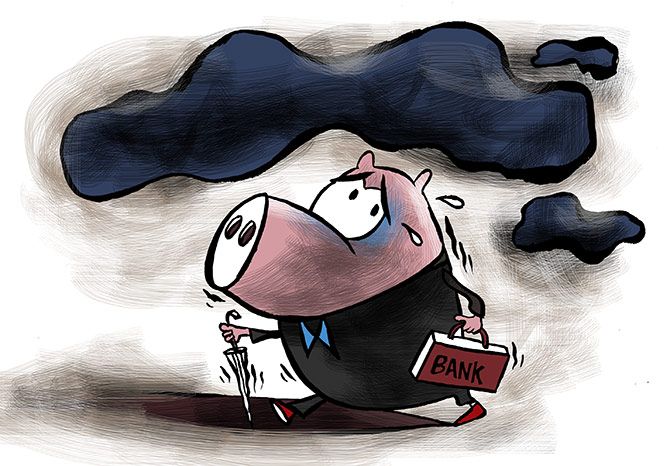 | « Back to article | Print this article |
Fitch Ratings on Monday said the plan to privatise two state-owned banks in the current financial year ending March 2022 could face delays amid renewed challenges for the Indian banking sector due to the second wave of Covid-19.

The government in the Budget announced plans to privatise two public-sector banks.
NITI Aayog has been entrusted with the task of selecting the banks and one general insurance company for the privatisation.
"The Indian government's plan to privatise two state-owned banks in the current financial year (FY22, ending March 2022) could face delays amid renewed challenges for the Indian banking sector," Fitch said in a statement.
Fitch said the current privatisation plan is an extension of the government's broader agenda to reform the Indian banking sector and reduce the number of state-owned banks further, which have come down from 27 in 2017 to 12 in 2020 after three successive rounds of consolidation.
"Nonetheless, the bold move to privatise state-run banks faces risk from political opposition and structural challenges including heightened balance-sheet stress due to the Covid-19 pandemic, which is likely to keep bank performance subdued for the next two to three years," it added.
Fitch believes that political support in favour of legislative changes to the Act, which are required in order to go through with the sale, could be a significant hurdle for the government.
"There could also be more resistance from the trade unions this time around, who will be against the safety-net withdrawal of state ownership.
"Success of the plan would also require sufficient interest from investor(s) willing to acquire large stake(s) in state-owned banks and run them," it added.
The rating agency said that state banks in general have long been plagued with muted investor appetite due to structurally weak governance frameworks which have resulted in persistently weak performance, reflected in significant asset-quality problems.
The Covid-19 pandemic has further dampened business and consumer confidence, with the impact on reported impaired loans manifesting potentially over an extended timeframe, considering the various forbearance and relief measures by the authorities.
State banks have played a more active role in extending these measures than the private banks, which will make it more difficult to reasonably assess stress for the state banks, thus adding to the risk of weak earnings performance for a protracted period, it added.
"State banks can also be difficult to manage. They have a significantly different culture and organisational practices (eg more bureaucratic) relative to private banks.
"Similar challenges and the absence of meaningful investor interest resulted in the state ultimately having to sell its majority stake in IDBI Bank to LIC in 2019, which has somewhat been privatisation in letter but not in spirit.
"However, this could change in 2021 if both government and LIC are able to divest a majority stake in the bank to an external investor, as it may be indicative of broader investor appetite in state banks with adequate loan-loss reserves."
Fitch believes the government prefers to privatise larger banks to maximise divestment inflows.
However, this will be challenging, since banks in this category - despite their wide reach and substantial franchises - have generally compromised financials, with impaired-loan ratios.
"Investor interest might be especially muted for banks which are currently restricted from pursuing loan growth to higher-yielding borrowers and branch expansion under the Reserve Bank of India's prompt corrective framework," Fitch added.
The government has budgeted Rs 1.75 lakh crore from stake sale in public sector companies and financial institutions.
Also the process of listing country's largest insurer LIC has been initiated, besides strategic sale process of 2 PSU banks and one general insurance company.